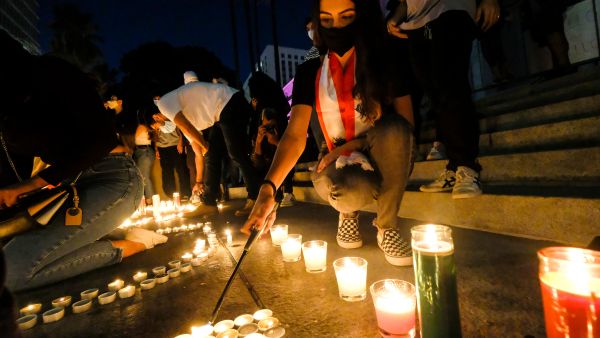Evidence implicates senior Lebanese officials in the August 4, 2020 explosion in Beirut that killed 218 people, but systemic problems in Lebanon’s legal and political system are allowing them to avoid accountability, Human Rights Watch said in a report released today.
The UN Human Rights Council should mandate an investigation, and countries with Global Magnitsky and similar human rights and corruption sanctions regimes should sanction officials implicated in ongoing violations of human rights resulting from the August 4 explosion and efforts to undermine accountability.
The 127-page report, “‘They Killed Us from the Inside’: An Investigation into the August 4 Beirut Blast,” sets out the evidence of official conduct, in a context of longstanding corruption and mismanagement at the port, that allowed for tons of ammonium nitrate, a potentially explosive chemical compound, to be haphazardly and unsafely stored there for nearly six years. The detonation of the chemical caused one of the largest non-nuclear explosions in history, pulverizing the port and damaging over half the city.
“The evidence overwhelmingly shows that the August 2020 explosion in Beirut’s port was caused by the actions and omissions of senior Lebanese officials who failed to accurately communicate the dangers posed by the ammonium nitrate, knowingly stored the material in unsafe conditions, and failed to protect the public,” said Lama Fakih, crisis and conflict director at Human Rights Watch. “A year later, the scars of that devastating day remain etched in the city while survivors and families of the victims await answers.”
Human Rights Watch drew on official correspondence regarding the Rhosus, the ship that brought the ammonium nitrate to the port, and its cargo, some of which has not been published before, and interviews with government, security, and judicial officials, to outline how the dangerous material arrived and was stored at the port. Human Rights Watch also detailed what government officials knew about the ammonium nitrate and what actions they took or failed to take to safeguard the population.
The evidence to date raises questions regarding whether the ammonium nitrate was intended for Mozambique, as the Rhosus’s shipping documents stated, or whether Beirut was the intended destination. The evidence currently available also indicates that multiple Lebanese authorities were, at a minimum, criminally negligent under Lebanese law in their handling of the cargo, creating an unreasonable risk to life, Human Rights Watch said.
Further, official documentation strongly suggests that some government officials foresaw and tacitly accepted the risks of death posed by the ammonium nitrate’s presence in the port. Under domestic law, this could amount to the crime of homicide with probable intent, and/or unintentional homicide. Under international human rights law, a state’s failure to act to prevent foreseeable risks to life violates the right to life.
Officials within the Ministry of Public Works and Transport, which oversees the port, were warned about the danger, yet failed to correctly communicate it to the judiciary or to adequately investigate the potentially explosive and combustible nature of the ship’s cargo, and the danger it posed. They then knowingly stored the ammonium nitrate alongside other flammable or explosive materials for nearly six years in a poorly secured and poorly ventilated hangar in the middle of a densely populated commercial and residential area, contravening international ammonium nitrate safe storage and handling guidance.
They also reportedly failed to adequately supervise the repair work undertaken on hangar 12 that may have triggered the explosion on August 4, 2020.
Official correspondence with customs officials, under the Finance Ministry, reflects that a range of ministry officials were aware of the dangers. Customs officials stated that they sent at least six letters to the judiciary requesting the sale or export of the material. But court records show that the customs officials were repeatedly told that their requests were procedurally incorrect. Judicial officials interviewed by Human Rights Watch said that customs did not need judicial authorization to sell, re-export, or destroy the material.
The Lebanese Army Command brushed off knowledge of the ammonium nitrate, saying they had no need for it, even after learning that its nitrogen grade classified it under local law as material used to manufacture explosives and required army approval to be imported and inspection. Military Intelligence, responsible for all security issues related to munitions, drugs, and violence at the port, took no apparent steps to secure the material or establish an emergency response plan or precautionary measures.
Both the then-Minister of Interior and the Director General of General Security have acknowledged that they knew about the ammonium nitrate aboard the Rhosus, but have said that they did not take action after learning about it because it was not within their jurisdiction to do so.
Sources indicated that State Security, an arm of the Higher Defense Council, which implements the country’s defense policy, was aware of the existence of the ammonium nitrate and its dangers since at least September 2019. But there was an unconscionable delay in reporting the threat to senior officials, and the information provided was incomplete. The first correspondence State Security sent to the president and the prime minister was on July 20, 2020, two weeks before the explosion.
President Michel Aoun, the chair of the Higher Defense Council, admitted that he had been aware of the ammonium nitrate’s presence since at least July 21, 2020, and had asked an advisor to follow up, but claimed that he was not responsible. Prime Minister Hassan Diab, the council’s vice-chair, had been aware of the ammonium nitrate’s presence since June 3, 2020, but took no apparent action beyond referring State Security’s July 20, 2020 report to the Justice and Public Works ministries.
The Beirut port explosion killed 218 people, and wounded 7,000, leaving at least 150 with a physical disability. It caused untold psychological harm, and damaged 77,000 apartments, displacing over 300,000 people. According to the World Bank, the explosion caused an estimated US$3.8-4.6 billion in material damage.
Lebanese officials vowed to investigate vigorously and expeditiously. But in the year since the explosion, procedural and systemic flaws in the domestic investigation have rendered it incapable of credibly delivering justice. These flaws include a lack of judicial independence, immunity for high-level political officials, lack of respect for fair trial standards, and due process violations.
Survivors of the explosion and the families of the victims have been vocal in calling for an international investigation, expressing their lack of faith in domestic mechanisms.
Nurse Jessica is one of many victims of Beirut blast-[REPORT] | https://t.co/RGERGOAOWQ | #Lebanon
— LBCI Lebanon News EN (@LBCI_News_EN) August 3, 2021
The case for an international investigation has strengthened. The UN Human Rights Council should mandate an investigation to identify the causes of and responsibility for the August 4 explosion, and the steps needed to ensure an effective remedy for victims and to prevent further rights violations, Human Rights Watch said.
Countries with Global Magnitsky and other human rights and corruption sanctions regimes should sanction Lebanese officials implicated in ongoing violations of human rights related to the explosion and efforts to undermine accountability, Human Rights Watch said. Such sanctions would reaffirm those countries’ commitments to promoting accountability for serious human rights abuse and provide additional leverage to those pressing for accountability through domestic judicial proceedings.
“Despite the devastation wrought by the blast, Lebanese officials continue to choose the path of evasion and impunity over truth and justice,” Fakih said. “The UN Human Rights Council should immediately authorize an investigation, and other countries should impose targeted sanctions on those implicated in ongoing abuses and efforts to impede justice.”








